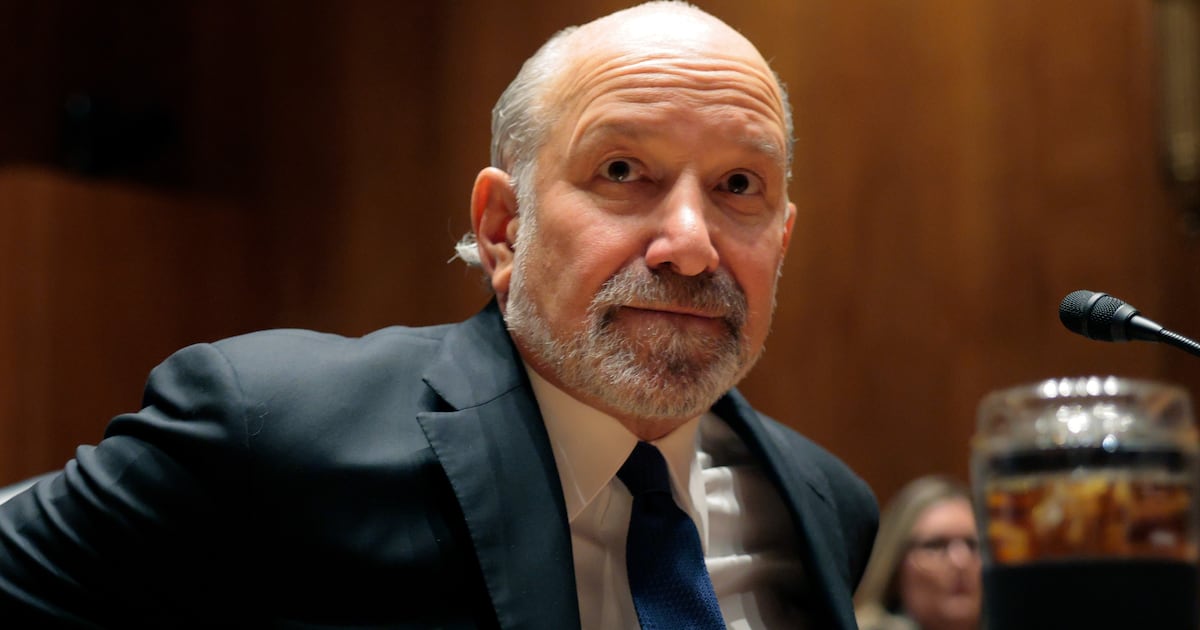The Minutes is a brilliantly sugared, very bitter pill. At first playwright and star Tracy Letts, and his on-fire company of actors, seem to take us to comedic Parks and Recreation territory. The play, which opens on Broadway on Sunday night (Studio 54, booking to July 24), is centered around a council meeting in the small town of Big Cherry, with a gallery of the strange, eccentric, and clueless blowhards you might expect flexing their jaded, policy-shaping muscles.
Mr. Oldfield (Austin Pendleton, scene-stealing, comic genius) is particularly exercised over parking spaces. Mayor Superba (an avuncular-meets-menacing Letts) and his fellow council colleagues are exasperated with Oldfield’s interruptions and crotchety mischief-making. Ms. Innes (Blair Brown) has a statement to read out that is also a rap sheet of local scandals. The sharp secretary Ms. Johnson (Jessie Mueller) has no time for Mr. Peel (Schitt’s Creek star Noah Reid) trying to make small talk over kids. He’s a pediatric dentist, but not hustling for business, he says. She also mispronounces Mr. Assalone (Jeff Still) as that name sounds, rather than, as he eventually gives up insisting, “Mr. Assalon-ay.” Ms. Matz (Sally Murphy) just seems loopy.
But something really isn’t right. Thunder is cracking outside, accompanied by torrential rain. The lights keep going out. What has happened to the missing Mr. Carp (Ian Barford), and at last week’s council meeting? No one will give Mr. Peel a simple answer. How the answers are revealed, and very dark they are, give the play its title, in that everything lies in the mysteriously unready minutes of that meeting.
First, Mr. Peel must battle to have them heard, and from this moment the play becomes not just an interrogation of small-town democracy but democracy itself, and how fragile and imperiled it is. How does white supremacy sustain itself? How is history rewritten and corruption accommodated as a necessity to maintain white hegemony? Big Cherry is the nightmare opposite of Schitt’s Creek.

(L-R) Jessie Mueller as Ms. Johnson, Noah Reid as Mr. Peel, Jeff Still as Mr. Assalone, Tracy Letts as Mayor Superba, and Cliff Chamberlain as Mr. Breeding.
Jeremy DanielIntentionally or not, the physical staging of The Minutes—Anna D. Shapiro directs, David Zinn is the designer—strikingly sets up the play’s central idea. We are in a crucible of democracy. In their council chamber, the cast forms a semi-circle on stage, and we the audience complete the circle, watching the inner workings of the meeting. The audience’s response to the action shows that, whatever else, Letts has succeeded in making an interactive play. The audience makes it clear they want to know the truth as much as the newly elected Mr. Peel.
Although the play feels beyond timely, Letts originally wrote it in 2017, as the Trump presidency ground into gear. (It opened on Broadway in February 2020, before COVID-19 closed it.) The Minutes bluntly shows us how society can fall apart under faulty strip lighting, all the while following committee rules and reciting the Pledge of Allegiance. It balances the comedy of small-town mundanity with a more dramatic indictment of racism and democracy’s failure.
For this critic, this play feels all too painfully up to the minute, as Republican-run legislatures seek to control what is taught in schools, doing all they can to stamp out discussion of LGBTQ and race-related issues, under a general anti-critical race theory banner. The outlawing of abortion, before any Supreme Court ruling on the matter, is under way state by state.
Quite apart from what is taught in schools, hundreds of anti-LGBTQ bills have been tabled in the legislatures, mostly focused on discriminating against trans kids. Gender affirming care has been labeled by legislators as “child abuse.” The language around the various “Don’t say gay” bills—including words like “groomer”—has led to an explosion of new anti-LGBTQ prejudice—and more isolation for LGBTQ kids who need support.
As Mr. Peel, Reid is as outwardly genial as he was playing Patrick, David’s boyfriend and eventual husband in Schitt’s Creek. But his anger rises, as Mayor Superba and his cronies do all they can to obstruct him from finding out what happened to Mr. Carp.
The key to the mystery comes, appositely enough, from something initially played for laughs, when the council members spring from behind their desks to enact the history of the battle that forms the foundation of the town’s history. Hilariously performed by the company, it features a white family and soldier bravely holding out against a group of Native American marauders. Except this isn’t the history of Big Cherry at all. In another history we hear that it was the Native Americans who were the victims of white aggression.

(L-R) Jeff Still as Mr. Assalone, Tracy Letts as Mayor Superba, and Cliff Chamberlain as Mr. Breeding.
Jeremy DanielPrevious to this, we have seen Mr. Hanratty (Danny McCarthy) try to table a bill to allow the construction of a fountain in celebration of the received wisdom—or ignorance—of that battle, and Mr. Blake (K. Todd Freeman), the only Black member of the council, try to engage colleagues’ interest in the idea of a “Lincoln Smackdown” at the event that would celebrate the town’s history.
Mr. Breeding (a lightly sneering Cliff Chamberlain) is disparaging about the need to give the disabled a ramp, airily dismissing Hanratty’s shock at his prejudice and insensitivity. Something shady has been happening around stolen bicycles, Mr. Assalone, and his brother, the chief of police. This feels very much a white man’s world, and the women of The Minutes—excellent as the actors are—feel underwritten for. The rules-observing Ms. Johnson is given one, very meager line when Mr. Peel wonders at her capitulation to the ways of the council.
Both Letts and Reid eventually separately let rip, as the younger man argues for democratic openness and decency, and telling a more embracing version of history, whereas Mayor Superba lays out—using Mr. Peel’s privilege against him, his SUV, and nice suburban home—what is on the line if Big Cherry’s history, and the way this town council’s work, is questioned. Dissent of any kind will not be tolerated. It would have been good to hear more from Mr. Blake about how he, as a Black man, came to sign up for what we see this council truly stands for.
The ending will go unspoiled here but must be mentioned and—for those who go to see The Minutes—will be much discussed. For this reviewer, it did and did not work. The banality of the evil and democratic collapse in Big Cherry and beyond are what the play so adroitly evokes. But then, in its closing moments we’re suddenly in Stepford Wives, Rosemary’s Baby territory. Shocking as it is, it felt like an unnecessary over-coloring of the play’s narrative. It does not detonate the play but feels like a sledgehammer just took the place of a fine chisel.
But then, one wonders how else dramatically we could have left this council chamber representing a bigger hell. Whatever else, Letts holds a black mirror up to us about where we are and where our society and we may be headed as Republican extremists and democracy’s destroyers take hold of local, national, and international politics. It is not just our vote that matters, The Minutes makes clear, but our active participation in the frayed-to-torn thing we still call democracy.







